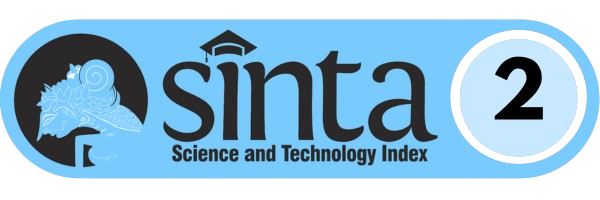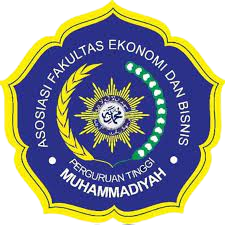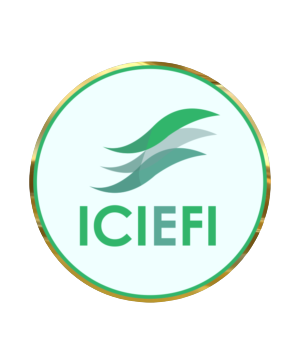Sustainability Analysis of the Revolving Fund Program of the LPDB (Revolving Fund Management Institution): MICMAC Method Approach
DOI:
https://doi.org/10.24269/ekuilibrium.v19i2.2024.pp245-259Abstract
The importance of access to credit for micro, small, and household craft enterprises, including cooperatives, has become a major focus in improving working capital financing and capital accumulation to support industrial income. The government through the LPDB (Revolving Fund Management Institution) has launched a revolving fund program that aims to strengthen the capital base of cooperatives, increase the capacity of human resources in business and financial management, and increase the role of cooperatives in expanding employment opportunities and reducing poverty. According to data from the Cooperative Business Development Division of the Denpasar City MSME Cooperative Office, from 2021 to 2023, there were five cooperatives that received the LPDB revolving fund program, but did not consistently reapply for the funds. This raises concerns regarding the sustainability of the program and the factors that influence it. This study aims to identify the factors that influence the sustainability of the LPDB program for cooperatives in Denpasar City. Using the MICMAC (Matrix of Cross Impact Multiplications Applied to a Classification) analysis method, this study reveals that the revolving fund administration requirements and members' information and knowledge about the revolving fund have the most significant direct influence. These findings underscore the importance of simplifying the administrative process and improving member knowledge to ensure the success of the program. In addition, active member participation emerged as an important predictor of program sustainability, highlighting the importance of members' direct involvement in supporting their economic activities. Thus using this method can uncover critical factors, and provide a comprehensive understanding that can inform policy adjustments and strategic implementation to improve program sustainability.
References
Ariyani, N., Prasetya, T., & Gilang, K. (2018). Prospective Structural Method Application to Identify Strategic Variable of Developing Ecotourism Region in Reservoir Area. Proceedings of the 1st Sampoerna University-AFBE International Conference. SU-AFBE 2018, 6-7 December 2018, 2(1), 1–9. https://doi.org/10.4108/eai.6-12-2018.2286308
Ariyudha, P. P. (2018). Tinjauan Penerapan Akuntansi Revolving Fund Pada Badan Pengelola Keuangan Dan Aset Daerah Kabupaten Badung. Politeknik Keuangan Negara STAN.
Budiarto, D. S., Amanda, A., & Nordin, N. (2023). Digital Technologies Application and Competitive Advantage for MSMEs Sustainability and Market Performance. Ekuilibrium: Jurnal Ilmiah Bidang Ilmu Ekonomi, 18(2), 169–178. https://doi.org/10.24269/ekuilibrium.v18i2.2023.pp169-178.
Chatziioannou, V., & Alvarez-Icaza, R. (2017). Unsupervised learning: From the Boltzmann Machine to the STDP network. IEEE Transactions on Neural Networks and Learning Systems, 28(8), 1824–1835.
Dinas Koperasi UMKM Kota Denpasar. (2023). Data Perkembangan Koperasi di Kota Denpasar Tahun 2022. Bali : Penerbit Mitra Wacana Media.
Fauzi, A. (2019). Teknik Analisis Keberlanjutan. Jakarta: Gramedia Pustaka Utama.
Godet, M. (1994). From anticipation to action: A handbook of strategic prospective. United Nations Educational : Scientific and Cultural Organization (UNESCO).
Harahap, E. (2017). Keharmonisan Keluarga Dengan Motivasi Belajar Siswa Dan Implikasinya Terhadap Layanan Bimbingan Dan Konseling (Studi Deskriptif-Korelasional di SMA N 4 Padangsidimpuan). Jurnal Bimbingan Dan Konseling, 3(1), 114–122.
Hardi, P., & Iswadi, H. (2022). Risk Management Practices And Cooperative Sustainability: A Study Of Denpasar Cooperatives. International Journal of Financial Research, 13(4), 1789–1802.
Hsiu, Y. ., Chiu, S. ., & Tieh, M. . (2009). Modified IPA for Order-Winner Criteria Improvement: A MICMAC Approach. Journal of Applied Aciences, 9(21), 3792–3803. https://doi.org/10.3923/jas.2009.3792.3803
Kusumawati, D., & Putri, N. (2022). Service Quality And Product Innovation In Enhancing Cooperative Performance: A Case Study In Denpasar. Journal of Innovation in Business and Economics, 10(2), 150–162.
Latifah, Sri W., Waluya, Ahmad J., & Mudrifah. (2021). The Performance of MSMEs: a Comprehensive Approaches based on Resource, Customers, Suppliers, and Characteristics of MSMEs. Ekuilibrium: Jurnal Ilmiah Bidang Ilmu Ekonomi, 16(2), 176–189. https://doi.org/10.24269/ekuilibrium.v16i2.2021.pp176-189.
Mustafa, M., & Rahim, R. (2019). Enhancing the Sustainability of LPDB’s Revolving Fund Program: A Focus Group Discussion Approach. Journal of Cooperative Studies, 12(2), 145–162.
Novita, R., & Purnomo, S. (2023). Building Trust For Sustainable Cooperative: Case Study Of Denpasar Cooperatives. Journal of Cooperative Organization and Management, 11(1), 100–289.
Nuriasih, N. K., & Yuliarmi, N. N. (2020). Pengaruh Modal, Asset, Volume Usaha, Dan Jumlah Anggota Terhadap Sisa Hasil Usaha Pada Koperasi Pemasaran. E-Jurnal Ekonomi EP Unud, 9(3), 626–656.
Pramudya, E. P., Hospes, O., & Termeer, C. J. A. M. (2017). Governing The Palm-Oil Sector Through Finance: The Changing Roles of The Indonesian State. Bulletin of Indonesian Economic Studie, 53(1), 57–82.
Prasetyo, A. D., & Sari, D. K. (2023). Economic Conditions And Market Dynamics Affecting Cooperative Sustainability: Evidence From Denpasar. Journal of Economic Development, Environment and People, 12(1), 45–58.
Putra, I. G. A. P., & Sudana, I. M. (2021). Determinants of sustainable cooperative performance in Bali, Indonesia. Management Science Letters, 11(6), 1247–1256.
Riana, I. G., Wiagustini, N. L. P., & Meydianawathi, L. G. (2014). Master Plan UMKM Berbasis Perikanan Untuk Meningkatkan Pengolahan Produk Ikan Yang Memiliki Nilai Tambah Tinggi. Jurnal Ekonomi Kuantitatif Terapan, 7(2), 102–119. https://doi.org/10.24843/JEKT.2014.v07.i02.p03
Rudianto. (2010). Akuntansi Koperasi, Konsep dan Teknik Penyusunan Laporan Keuangan, Edisi Kedua. Jakarta: Erlangga.
Runtunuwu, Prince C. H., Mazelan N. A., & Rajasekera, J. (2023). Analysis of Government Funding Performance on Economic Growth and Human Development Index in Indonesia. Ekuilibrium: Jurnal Ilmiah Bidang Ilmu Ekonomi, 18(2), 136–148. https://doi.org/10.24269/ekuilibrium.v18i2.2023.pp136-148.
Satria, D. P., & Sutrisno, J. (2022). The Role Of Cooperatives In Local Development And Its Impact On Cooperative Sustainability: A case study in Denpasar. Journal of Community Development, 14(3), 321–334.
Setiawan, A., & Arifin, Z. (2023). The Role Of Surplus Allocation In Enhancing Cooperative Sustainability: Evidence From Denpasar, Indonesia. Asian Journal of Innovation and Entrepreneurship, 12(3), 289–302.
Soenarko. (2003). Public Policy: Pengertian Pokok untuk Memahami dan Analisa Kebijaksanaan Pemerintah. Surabaya: Airlangga University Press.
Supriyanto, S., & Pramono, S. H. (2023). Cooperative Business Volume And Its Impact On Financial Sustainability: A Case Study Of Denpasar Cooperatives. International Journal of Cooperative Studies, 1(1), 45–56.
Tangkilisan, H. N. (2003). Implementasi Kebijakan Publik. Yogyakarta: Lukman Offset YPAPI.
Trisnojuwono, A., Hubeis, A. V. S., & Cahyadi, E. R. (2017). Analisis Strategi Pembiayaan Usaha Mikro Dan Kecil Melalui Revolving Fund Pada Lembaga Pengelola Revolving Fund. MANAJEMEN IKM: Jurnal Manajemen Pengembangan Industri Kecil Menengah, 12(2), 178–186. https://doi.org/10.29244/mikm.12.2.178-186
Utami, D. D. (2019). Analisis Penyusunan Kebijakan Pengelolaan Revolving Fund pada Kementerian Negara Koperasi dan UKM. Jakarta: Universitas Indonesia.
Wahyu, I. G. A. S., & Aswitari, L. P. (2022). Pengaruh Modal, Variasi Produk Dan Manajemen Terhadap Kesejahteraan Anggota Usaha Koperasi Di Kabupaten Jembrana. E-Jurnal Ekonomi EP Unud, 10(12), 4738–4772.
Wibowo, T., & Nurweni, A. (2022). The impact of cooperative capital on its financial performance: Evidence from Indonesian cooperatives. Journal of Business and Retail Management Research, 16(1), 154–161.
Widayati, A., & Susanto, H. (2023). The Impact Of Regulatory Policies On Cooperative Sustainability: A Study in Denpasar. Journal of Economic Policy and Regulation, 24(2), 189–203.
Winata, I. N., & Setiawan, A. (2023). The Impact Of Lpdb Administrative Requirements On The Sustainability Of Revolving Funds: A Case Study Of Denpasar Cooperatives. International Journal of Cooperative Finance and Management, 11(3), 234–248.
Downloads
Published
How to Cite
Issue
Section
License
Retained Rights/Terms and Conditions of Publication
1. As an author you (or your employer or institution) may do the following:
- make copies (print or electronic) of the article for your own personal use, including for your own classroom teaching use;
- make copies and distribute such copies (including through e-mail) of the article to research colleagues, for the personal use by such colleagues (but not commercially or systematically, e.g. via an e-mail list or list server);
- present the article at a meeting or conference and to distribute copies of the article to the delegates attending such meeting;
- for your employer, if the article is a ‘work for hire’, made within the scope of your employment, your employer may use all or part of the information in the article for other intra-company use (e.g. training);
- retain patent and trademark rights and rights to any process, procedure, or article of manufacture described in the article;
- include the article in full or in part in a thesis or dissertation (provided that this is not to be published commercially);
- use the article or any part thereof in a printed compilation of your works, such as collected writings or lecture notes (subsequent to publication of the article in the journal); and prepare other derivative works, to extend the article into book-length form, or to otherwise re-use portions or excerpts in other works, with full acknowledgement of its original publication in the journal;
- may reproduce or authorize others to reproduce the article, material extracted from the article, or derivative works for the author's personal use or for company use, provided that the source and the copyright notice are indicated, the copies are not used in any way that implies RCEPM-LIPI endorsement of a product or service of any employer, and the copies themselves are not offered for sale.
All copies, print or electronic, or other use of the paper or article must include the appropriate bibliographic citation for the article's publication in the journal.
2. Requests from third parties
Although authors are permitted to re-use all or portions of the article in other works, this does not include granting third-party requests for reprinting, republishing, or other types of re-use. Requests for all uses not included above, including the authorization of third parties to reproduce or otherwise use all or part of the article.
3. Author Online Use
- Personal Servers. Authors and/or their employers shall have the right to post the accepted version of articles pre-print version of the article, or revised personal version of the final text of the article (to reflect changes made in the peer review and editing process) on their own personal servers or the servers of their institutions or employers without permission from Universitas Muhamamdiyah Ponorogo, provided that the posted version includes a prominently displayed Universitas Muhamamdiyah Ponorogo copyright notice and, when published, a full citation to the original publication, including a link to the article abstract in the journal homepage. Authors shall not post the final, published versions of their papers;
- Classroom or Internal Training Use. An author is expressly permitted to post any portion of the accepted version of his/her own articles on the author's personal web site or the servers of the author's institution or company in connection with the author's teaching, training, or work responsibilities, provided that the appropriate copyright, credit, and reuse notices appear prominently with the posted material. Examples of permitted uses are lecture materials, course packs, e-reserves, conference presentations, or in-house training courses;
- Electronic Preprints. Before submitting an article to an Ekuilibrium: Jurnal Ilmiah Bidang Ilmu Ekonomi, authors frequently post their manuscripts to their own web site, their employer's site, or to another server that invites constructive comment from colleagues. Upon submission of an article to Ekuilibrium: Jurnal Ilmiah Bidang Ilmu Ekonomi, an author is required to transfer copyright in the article to Economy Faculty Universitas Muhammadiyah Ponorogo, and the author must update any previously posted version of the article with a prominently displayed Economy Faculty Universitas Muhammadiyah Ponorogo copyright notice. Upon publication of an article by the Universitas Muhammadiyah Ponorogo, the author must replace any previously posted electronic versions of the article with either (1) the full citation to the work with a Digital Object Identifier (DOI) or link to the article abstract in Ekuilibrium: Jurnal Ilmiah Bidang Ilmu Ekonomi journal homepage, or (2) the accepted version only (not the final, published version), including the Economy Faculty Universitas Muhammadiyah Ponorogo copyright notice and full citation, with a link to the final, published article in journal homepage.
4. Articles in Press (AiP) service
Economy Faculty Universitas Muhammadiyah Ponorogo may choose to publish an abstract or portions of the paper before we publish it in the journal. Please contact our Production department immediately if you do not want us to make any such prior publication for any reason, including disclosure of a patentable invention.
5. Author/Employer Rights
If you are employed and prepared the article on a subject within the scope of your employment, the copyright in the article belongs to your employer as a work-for-hire. In that case, Economy Faculty Universitas Muhammadiyah Ponorogo assumes that when you sign this Form, you are authorized to do so by your employer and that your employer has consented to the transfer of copyright, to the representation and warranty of publication rights, and to all other terms and conditions of this Form. If such authorization and consent has not been given to you, an authorized representative of your employer should sign this Form as the Author.
6. RCEPM-LIPI Copyright Ownership
It is the formal policy of Economy Faculty Universitas Muhammadiyah Ponorogo to own the copyrights to all copyrightable material in its technical publications and to the individual contributions contained therein, in order to protect the interests of the Economy Faculty Universitas Muhammadiyah Ponorogo, its authors and their employers, and, at the same time, to facilitate the appropriate re-use of this material by others. Economy Faculty Universitas Muhammadiyah Ponorogo distributes its technical publications throughout the world and does so by various means such as hard copy, microfiche, microfilm, and electronic media. It also abstracts and may translate its publications, and articles contained therein, for inclusion in various compendiums, collective works, databases and similar publication.
7. Licensing Terms
Ekuilibrium is licensed under a Creative Commons Attribution-ShareAlike 4.0 International License.
Permissions beyond the scope of this license may be available at https://journal.umpo.ac.id/











